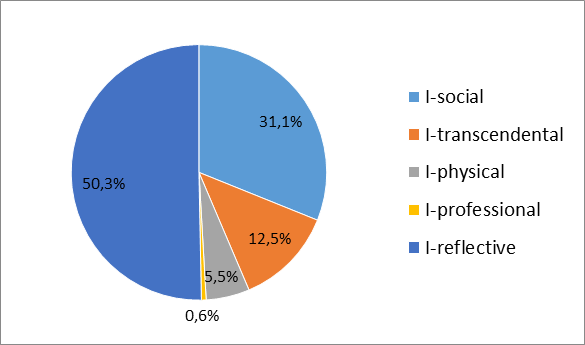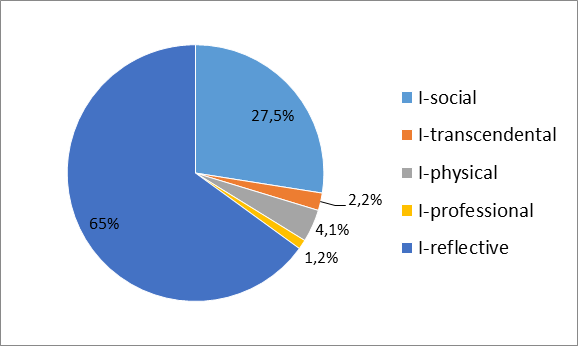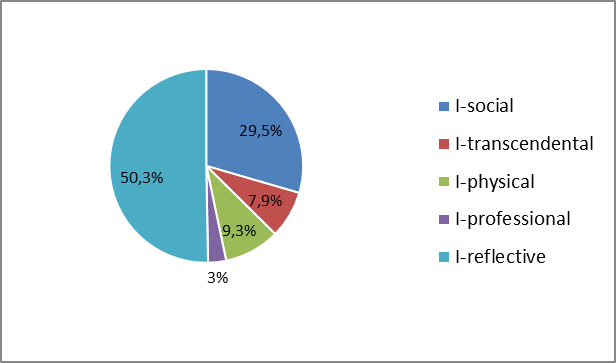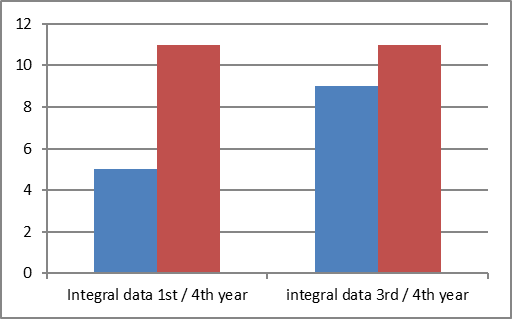Abstract
Formation of a professional self-concept in conjunction with the formation of a professional position is a necessary condition for the subsequent and successful professional activity. The purpose of this research was to study the dynamics of the development of professional self-concept of students - future specialists in the field of psychology and education. An experiment was carried out aimed at revealing the level of the formation of professional self-concept of 1st-year, 3rd-year, and 4th-year students, an analysis of the obtained data is presented. The author made a statistical check of the received data, made conclusions about the revealed indicators. It was revealed that the fact of studying at a university does not contribute to the effective formation of a professional self-concept (subjects of all years demonstrate low values of the indicators of professional self-concept and insignificant and unsatisfactory dynamics of those indicators from year to year. There was made the assumption that the effective development of the professional self-concept is possible only with the combined effect of the psychological and pedagogical conditions of the organization of education and upbringing. Thus, there was developed a program devoted to the formation of professional self-concept of students - future specialists in the field of psychology and education.
Keywords: Professional self-conceptdynamics of professional self-conceptpsychological and teacher educationfuture specialists
Introduction
‘Modern people change and modernize the surrounding world faster than they change themselves’ – this idea of Scheler (2017) very figuratively describes the problems associated with the professional development and staff preparation. Scientific and technological progress, rapid development of science and technology, serve as a basis for making increasingly strong demands on university graduates. Modern information society challenges universities with the goal to educate and teach highly qualified and competitive specialists. Therefore, in the current socio-economic conditions, the problems of professional formation of future specialist and development of their professional self-concept become particularly relevant.
In accordance with the functions that self-concept fulfills in individual’s life, it is commonly-accepted to single out its several types, including the professional one. Professional self-concept is a part of self-concept itself and plays a significant role in the formation of one's personality.
Being a part of integral self-concept, professional self-concept development serves as a basis for the formation and development of one's personality, one’s activity and mental health. In this connection, it becomes obvious that it is necessary to study the phenomenon of professional self-concept.
Problem Statement
The term ‘self-concept’ appeared in Russian pedagogy and psychology quite recently (in the 50s of the 20th century), after the publication of a number of works by foreign authors, although, as a psychic reality, has existed in science for a long time. The representative of the phenomenological approach to behavior, and a founder of the client-centered therapy Carl Rogers defines self-concept as the organized, consistent, conceptual gestalt composed of perceptions of the characteristics of the ‘I’ or ‘me’ and the perceptions of the relationships of the ‘I’ or ‘me’ to others and to various aspects of life, together with the values attached to these perceptions (Rogers, 1977). According to Rogers, on the one hand, this gestalt is accessible to the mind, although it is not necessarily always supraliminal, on the other hand, it is a fluid and volatile gestalt, which forms a specific integrity at every moment. Significant influence on the formation of this concept was provided by the works of James (James, 1890), who divided the global, personal Self (Self) into interacting self-conscious (I) and I-as-object (Me).
According to the ideas of Burns (Burns, 1986), the self-concept can be represented in the form of a hierarchy with the global self-concept on top, which includes various facets of self-consciousness: stream of consciousness, the sense of one's own continuity and uniqueness, self-conscious and I-as-object. In our work the basic definition of the self-concept is considered the one introduced by Burns in his book ‘Self-concept Development and Education’ and adopted on the basis of the theoretical propositions of James (1890), Rogers (1977, 1980) – ‘a dynamic complex of attitudes held towards themselves by each person coupled with their self-esteem’.
A significant amount of works has been devoted to the problem of professional self-concept. Betz examines the issues of self-efficacy and career development (Betz, 1994, Betz, 2000, Betz, 2004), Super describes the ‘Life Roles Rainbow’ theory (Super, 1963); Chin (2014) says in ‘Development of Professional Identity’ that higher education institutions should create conditions for the development of students’ professional qualities.
Observing Russian researchers the studies of Markova (1996) are of great interest, who defines the professional self-concept as ‘a complex of man's representations of himself as a professional; it is a holistic image of himself as a professional, a system of attitudes and affirmations toward himself as a subject of professional activity’.
Also, among Russian researchers there are works of Turchaninov (1988), dedicated to student's readiness for professional pedagogical activity in the context of the self-concept. The author, when analyzing the components of individual professional consciousness, introduces such concepts as professional self-concept, individual self-concept of professional activity and individual self-concept of a student. Within the framework of the problem of the professional self-concept, Zeer (2003), Klimov (1984), Markova (1996) and others consider the phenomenon of a professional career.
Thus, in scientific literature professional self-concept is defined through concepts such as: 1) a part of the whole (with respect to the self-concept); 2) attitudes in the context of professional formation and development of an individual; 3) a set or a system of professional representations by an individual as a subject of professional activity; 4) individual meaning of the ‘I’; 5) multilevel and multicomponent education.
As it can be seen, there are differences in the degree of study of self-concept and professional self-concept. The range of concepts used in the definition of a professional self-concept is much narrower than in the definition of a general self-concept. The area of manifestation of professional self-concept as a sphere of life activity is more specific and is considered in the context of the professional development and formation of a subject of activity. Professional development is the development and implementation of the self-concept, when interaction of the self-concept and reality occurs while playing and performing professional roles. In this regard, we define the
A structural design of self-concept and professional self-concept is similar, but their carrier subjects are different. If the self-concept refers to an individual as a whole, then the professional self-concept refers to the individual as a subject of a professional activity. It is the professional self-concept that gives a person opportunities for self-realization and growth.
Research Questions
Considering mentioned above we have decided to find out if there is any development of professional self-concept of students who will become school psychologists during their study at university.
Purpose of the Study
The research was based on the hypothesis that the formation of a professional self-concept among students-future school psychologists undergoes significant changes in the process of university education.
Therefore, the purposes of our research were:
to study the dynamics of the development of professional self-concept of students - future specialists in the field of psychology and education
to design methodological recommendations for its improvement
Research Methods
Theoretical and empirical methods.
In our research work we used the following set of methods: theoretical analysis of scientific literature, generalization of advanced psychological and pedagogical experience, survey-diagnostic methods (testing), statistical and mathematical processing of the received data. Testing was conducted using methods:
‘Who am I?’ method (Kuhn, 2006), where the subjects are given 12 minutes to answer the question ‘Who am I?’ (giving 20 nouns as answers).
Professional self-concept as a justification of the impact on another person (Abramova, 2003), where the subjects are asked to evaluate to what extent the proposed judgments are true for them according to the 10-point scale.
Study base.
The empirical study was conducted in 2016-2017 on the basis of the Institute of Psychology and Education of Kazan (Volga region) Federal University with students who study for the bachelor’s degree in psychological and pedagogical education (20 1st-year students, 25 3rd-year, 29 4th-year students).
Findings
When analyzing the results using the method ‘Who am I?’ all the answers were divided into the following groups: ‘I-reflective’, ‘I-social’, ‘I-transcendental’, ‘I-physical’. In accordance with the purposes of our research, in addition to the ‘I-social’ group, we also singled out the group ‘I- professional’, that is, the description of the I-concept, through the definition of professional roles (I am a future teacher, I am a psychologist). Thus, according to this test method, we show results distributed over 5 groups.
The method ‘Professional self-concept as a justification of the impact on another person’ is used to study the importance / insignificance of other people for future educators and psychologists, to reveal the degree of awareness and recognition of the value of another person's development, as well as their ideas about human development and the grounds for choosing how to influence students. The results obtained by the method of the students of different courses were analyzed by 6 factors. The results of the general, cumulative (integral) index were also analyzed. The reliability of the mean difference in the values of the studied traits was verified using the Student's test (t-test).
‘Who am I?’ method results.
The percentage of the results of the 1st year students obtained by the method ‘Who am I?’ (Kuhn & McPartland, 2006) is shown in Figure
It was found out that the 1st year students describe themselves through ‘I-reflective’ (‘I am beautiful’, ‘I am merry’, etc.) more often - 50.3%. The indicator ‘I am social’, a description of oneself as a bearer of certain social roles - 31.1%. The third group, ‘I-transcendental’, where the 1st - year students described themselves regardless of a particular social situation (‘I am a living being’, ‘I am a grain of sand’, ‘I am a part of the universe’) is represented by 12.5% of the answers. The smaller group ‘I-physical’ contains answers of freshmen, related to a physical description of their personality as an object in time and space (‘I am blond’, ‘I live in Kazan’) - 5.5%.
Responses of subjects related to the description of their self-concept through professional characteristics – ‘I-professional’ accounted only for 0.6% of the total number of responses received.

The following results were obtained for the group of the 3rd – year students: ‘I-reflective’ - 65%; ‘I-social" - 27.5%; ‘I-physical’ - 4,1%; ‘I-transcendental’ - 2.2%, ‘I-professional’ - 1.2%.

For the group of the 4th – year students, the distribution of scores is as follows: ‘I-reflective’ - 50.3%; ‘I-social’ - 29.5%; ‘I-physical’ - 9.3%; ‘I-transcendental’ - 7.9%; ‘I-professional’ - 3%.

Thus, it was found that the number of ‘personal’ responses (I-reflective) significantly exceeds the number of ‘role-based’ responses. In the least degree, students describe themselves through the ‘I-physical’, and ‘I-transcendental’.
We also revealed the following: when describing their self-concept, the percentage of describing oneself as a professional is very small. At the same time, there is a slight increase in the percentage of older students, but it is minimal (1st year - 0.6%, 3rd year - 1.18%, 4th year - 3%). It can be explained through a small extent of identification their image with the image of a professional. Or, according to the concept of Zeer, graduate students are at a regular stage of the ‘crisis of professional identity’, related to the fact that they have not yet begun their professional activities. In addition, it can be assumed that the low level of professional self-identity is associated with a low level of development of applied skills of students, with the prevalence of theoretical education
‘Professional self-concept as a justification of the impact on another person’ method results.
As mentioned earlier, this method is used to study the significance / insignificance of other people for future educators and psychologists. It is a test questionnaire containing 60 statements, each of which future psychologists should evaluate on a 10-point scale. Then the results are evaluated on six factors: 1) development of the other: a complex and ambiguous criterion of human development / a simple and unambiguous criterion of human development; 2) ideas about human development: a complex idea of the mechanisms of human development / a simple idea of the mechanisms of human development; 3) the idea of the norms of mental development: the use of scientific criteria of the norms of mental development / the creation of own (folk and common-sense) criteria of the norms of mental development; 4) the idea of the impact on another person: responsibility / irresponsibility; 5) the importance / insignificance of others; 6) recognition / non-recognition of individual autonomy and self-actualization mechanisms.
The results are also evaluated on a basic scale that diagnoses the recognition of the value of another person (integral index). A high integral index (the maximum number of points) reveals awareness of one's openness to the influence of other people, recognition of the value of another person, orientation to objective criteria of the norms of mental development, a desire to change self -image, recognition of the individual's autonomy, orientation to complex social criteria of human development. Minimal number of points describes closeness to the influence of other people, self value recognition, orientation to subjective criteria in the understanding of the norms of mental development, unalterable self -image, dependence on other people in self- development, orientation to simple criteria of human development.
After testing to check a reliable difference between the means of 6 factors, as well as a reliable difference between the means of the integral index, we used Student's t-test for students of different years.
Significant differences between the students of the 1st and 4th year were revealed for the following factors: 1st factor ‘Development of the other’, 2nd factor "Ideas about the mechanisms of human development", and 6th factor ‘My development’.
Significant differences between the students of the 3rd and 4th year were revealed for the following factors: 4th factor ‘Ideas about the impact on another person: responsibility/irresponsibility’, 6th factor ‘My development’.
There were no other significant differences for the factors.
An important indicator in our study is the integral index showing the participants' awareness of their openness to the influence of other people, the recognition of the value of another person, orientation to objective criteria of the norms of mental development and their desire to change self-image. This indicator justified the data obtained for 6 intermediate factors, namely: the results obtained on the sample of the 4th year students differ significantly from the results obtained in the samples of the students of the 3rd and the 1st years.
We ascertain that the subjects of all years demonstrate low values of the indicators relatively possible maximum which could be scored in this method (max 600 for intermediate factors, max 60 for integral index).
The distribution of significant differences between the means according to the method ‘Study of the professional I-conception’ is shown in histograms in Fig.


Conclusion
The main goal of the research was to test the hypothesis that the professional self-concept undergoes significant changes in the process of university education.
To test the experimental hypothesis, a study was conducted using psychodiagnostic techniques. It was revealed that the dynamics of the indicators of the professional I-concept is observed from the year to the year. But this change is insignificant and unsatisfactory. Thus, it was revealed that the fact of studying at a university does not contribute to the effective formation of a professional self-concept. Although its formation, in conjunction with the formation of a professional position is a necessary condition for the subsequent successful professional activity.
Considering the revealed minimal dynamics of the professional self-concept, one can raise a question of the effectiveness of educational work in a university, as well as the need to develop a special complex of educational activities that contribute to the formation of professional self-concept of students - future specialists in psychology and education. In this regard, we made the assumption that the effective development of the professional self-concept is possible only with the combined effect of the psychological and pedagogical conditions of the organization of education and upbringing. We have developed a program devoted to the formation of professional self-concept of students - future specialists in the field of psychology and education. The program includes several blocks
The first block, teaching and diagnostics, includes the following components: motivational - formation of students' ideas about professional I-concept and the need for its development for subsequent professional activities; diagnostic - is connected with the identification of the actual level of the formation of professional self-concept.
The second block, goal-setting, includes a target component – setting with students the goals and tasks of work on the development of professional self-concept.
The third block - implementation, allows students to apply theoretical knowledge in practice and includes a procedural component, which involves working with students aimed at developing professionally important qualities, professional position - all this contributes to the development of a professional self-concept. The subject component is the awareness of the need and active work of students in self-education.
The fourth block, control, provides control and self-control of the activities of students. It includes: evaluation component - students' assessment of the results of their activities on the criteria mentioned above, and diagnostic component - retesting with the diagnostic methods aimed at identifying the effectiveness of the work, reflection on the work done. This information is necessary for the subsequent corrective work aimed at both correction of professionally significant personal qualities, and on the establishment of efficiency and improvement of the program for the development of the professional self-concept.
All 4 blocks include both traditional (applied in all educational establishments (lectures, seminars, practical classes) and innovative (interactive training, open-podiums, etc.) forms of work. The main feature of our work is the complexity and precise planning of the work carried out for students of each year. In the future it is planned to implement this program and conduct a teaching experiment.
Acknowledgments
The work is performed according to the Russian Government Program of Competitive Growth of Kazan Federal University.
References
- Abramova, G. S. (2003). Practical psychology: course book for students. Мoscow: Akademichesky Proyect Publ.
- Betz, N. (1994). Self-concept theory in career development and counseling. Career Development Quarterly, 43(1), 32-41.
- Betz, N., & Schifano, R. (2000). Increasing realistic self-efficacy and interests in college women. Journal of Vocational Behavior, 56, 35-52.
- Betz, N. (2004). Contributions of self-efficacy theory to career counseling: a personal perspective. The Career Development Quarterly, 52, 340–353.
- Burns, R. B. (1986). Self-Concept Development and Education. N.Y.: Holt, Rinehart & Winston.
- Chin, P. T. (2014). Educating for Professional Identity Development. Singapore: Ruby Printing Pte Ltd.
- James, W. (1890). The principles of psychology. New York: Dover.
- Klimov, E. A. (1984). Psychology of a professional. Moscow: Smysl.
- Markova, A. K. (1996). Psychology of professionalism. Moscow: Prosveshcheniye.
- Rogers, C. (1977). Personal Power: Inner Strength and Its revolutionary. N.Y.: Impact.
- Rogers, C. (1980). A way of being. Boston: Houghton Mi.
- Scheler, M. (2017). The nature of sympathy. Routledge.
- Super, D. E. (1963). Self-concepts in vocational development. Career development: Self-Concept Theory. New York: College Entrance Examination Board.
- The "Who am I?" Kuhn test. (M. Kuhn, T. Macpartland, modification by T. Rumyantseva) (2006) Rumyantseva Т.V. Psychological counseling: the diagnosis of relationships in a pair. St. Petersburg. P. 82-103.
- Turchaninov, Y. I. (1998). Teaching communication techniques as a means of increasing the readiness of students of a pedagogical university to professional activity (Doctoral dissertation). Moscow: Moscow State University.
- Zeer, E. F. (2003). Psychology of profession. Ekaterinburg: Delovaya kniga.
Copyright information

This work is licensed under a Creative Commons Attribution-NonCommercial-NoDerivatives 4.0 International License.
About this article
Publication Date
05 September 2018
Article Doi
eBook ISBN
978-1-80296-044-0
Publisher
Future Academy
Volume
45
Print ISBN (optional)
-
Edition Number
1st Edition
Pages
1-993
Subjects
Teacher training, teacher, teaching skills, teaching techniques
Cite this article as:
Vashetina, O. V. (2018). The Development Of Students’ Professional Self-Concept. In R. Valeeva (Ed.), Teacher Education - IFTE 2018, vol 45. European Proceedings of Social and Behavioural Sciences (pp. 816-824). Future Academy. https://doi.org/10.15405/epsbs.2018.09.95

